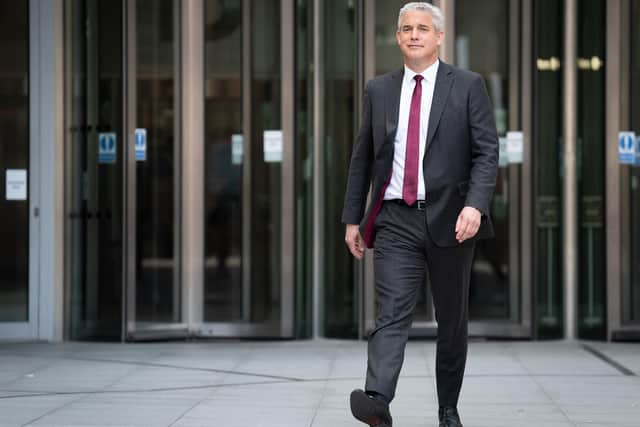NHS: Government turns to private healthcare to slash growing waiting lists
and live on Freeview channel 276
The government has turned to private sector capacity in a bid to cut NHS waiting lists.
Thirteen new community diagnostic centres (CDCs) will be opened across England to carry out an additional 742,000 scans, checks and tests per year. Eight of the new facilities will be operated by the private sector – although services will be free to patients – and five will be run by the NHS.


Advertisement
Hide AdAdvertisement
Hide AdHealth Secretary Steve Barclay said: “We must use every available resource to deliver life-saving checks to ease pressure on the NHS.
“By making use of the available capacity in the independent sector, and enabling patients to access this diagnostic capacity free at the point of need, we can offer patients a wider choice of venues to receive treatment and in doing so diagnose major illnesses quicker and start treatments sooner.”
Figures released last month revealed NHS waiting lists stood at 7.47m at the end of May, the highest number since records began in 2007.
Private centres will operate similarly to their NHS counterparts, the government said, but staff will be employed by private operators, which also own the buildings.
Advertisement
Hide AdAdvertisement
Hide AdSites in the South West – located in Redruth, Bristol, Torbay, Yeovil and Weston Super Mare – will be operated by diagnostics company InHealth.
Other private facilities will also be located in Southend, Northampton and south Birmingham and join four already operating in Brighton, north Solihull, Oxford and Salford. The new NHS-run sites are in Hornchurch, Skegness, Lincoln, Nottingham and Stoke-on-Trent.
The government pledged to open 160 CDCs by 2030. There are currently 114 operating, which have carried out 4.6m tests, checks and scans since July 2021.
A number of other measures to use capacity in the private sector have been outlined by the elective recovery taskforce, which was set up in December.
Advertisement
Hide AdAdvertisement
Hide AdThese include using data from private health providers to identify where they could take on more NHS patients to help clear backlogs. They will also look at using the private sector to train junior NHS staff.
Health minister and elective recovery taskforce chair Will Quince added: “We have already made significant progress in bringing down waiting lists, with 18 month waits virtually eliminated.
“I chaired the elective recovery taskforce to turbocharge these efforts and help patients get the treatment they need. These actions will bolster capacity across the country and give patients more choice over where and when they are treated.”
However, Labour said the government is currently not making enough use of private capacity.
Advertisement
Hide AdAdvertisement
Hide AdThe party claims 331,000 patients waiting for NHS care could have been treated since January 2022.
Shadow health secretary Wes Streeting, said: “The Conservatives are failing to make use of private sector capacity and patients are paying the price.
“No-one should be waiting in pain while hospital beds that could be used lie empty. The next Labour government will use spare capacity in the private sector to get patients seen faster.”
As the government turns to the private sector, concerns have also been raised about the NHS remaining a public service.
Advertisement
Hide AdAdvertisement
Hide AdSharon Graham, General Secretary of Unite the union, said: "We urgently need to improve NHS wait times, but we should be doing this for the long term, not by Rishi's latest election giveaway.
"The sooner we tackle the real problem of jobs, pay and conditions, the sooner we will retain and attract the workers of the future to keep our NHS where it should be – in public hands.
"We have seen what more privatisation does, we only have to look at the eye watering energy bills. We will no doubt be overpaying private companies to provide services that should be delivered within our NHS.”
Prime Minister Rishi Sunak vowed to bring waiting lists down earlier this year, but last month he said industrial action across the NHS is making the task “more challenging”.
Comment Guidelines
National World encourages reader discussion on our stories. User feedback, insights and back-and-forth exchanges add a rich layer of context to reporting. Please review our Community Guidelines before commenting.
